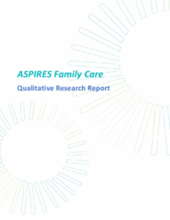INTRODUCTION
The Accelerating Strategies for Practical Innovation and Research in Economic Strengthening (ASPIRES) Project, funded by PEPFAR and USAID and managed by FHI 360, was designed to support gender-sensitive programming, research and learning to improve the economic security of highly vulnerable individuals, families and children. The ASPIRES mandate included designing and implementing rigorous research to evaluate programs and inform a new understanding of best practices in economic strengthening (ES) for vulnerable populations. With support from USAID’s Vulnerable Children Fund (formerly Displaced Children and Orphans Fund - DCOF), ASPIRES’ Family Care project focused on how ES interventions can help children remain in family care rather than separating to residential care facilities, living on the street, or migrating for work. Keeping families together reduces children’s risk of neglect, abuse and exploitation and increases the likelihood that they will experience positive physical and mental health outcomes.
Through Family Care, ASPIRES sponsored two learning projects in Uganda intended to reach economically and socially vulnerable families with a child at risk of separation or whose previously separated children were returning to family care. The Family Resilience (FARE) and Economic Strengthening to Keep and Reintegrate Children in Family Care (ESFAM) projects offered a range of services to increase family stability and reduce the likelihood of future separation or re-separation. Both projects were based on the theory that a combination of case management, social support and household economic and livelihood strengthening would stabilize highly vulnerable households, facilitating the return of separated children to family care and preventing future family disintegration. In addition to supporting families, the projects offered an opportunity for learning about how to provide these services, how families experienced them and how well they worked through in-depth, longitudinal qualitative research.
Theory of change
Both FARE and ESFAM were based on an understanding, from practice wisdom and the literature, that a combination of economic, social, and contextual issues contribute to family-child separation, in ways that likely differ for every family. Interventions, therefore, should be aligned to the specific needs of a household. The projects’ theory of change posited that tailored ES activities along with case management-based social support activities would reduce drivers of separation, making families more resilient, which would reduce child separation and support child reintegration.
In support of ASPIRES’ objective to assess the effects of different types of economic strengthening activities integrated with family support activities among targeted families, the Family Care project designed a mixed methods evaluation to be implemented alongside programming. Longitudinal qualitative research was integrated to help understand how (well), from participants’ perspectives, the FARE and ESFAM interventions aligned with project-identified drivers of separation and families’ experienced effects on economic and social family well-being. The findings presented in this report are derived from the longitudinal descriptive data generated as part of the evaluation design.

